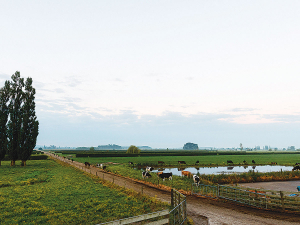DairyNZ Levy Vote Underway as Chair Highlights Seven-Fold Return
Voting has started for the renewal of DairyNZ's milksolids levy.
 DairyNZ has confirmed that a 15% stock reduction was not a recommendation of the Climate Change Commission.
DairyNZ has confirmed that a 15% stock reduction was not a recommendation of the Climate Change Commission.
OPINION: The recent Climate Change Commission discussion document has made many farmers anxious.
Quite rightly, they are keen to know what’s in store for them and DairyNZ has been fielding calls from farmers.
The Climate Change Commission was formed alongside work to set the country’s climate targets (including biogenic methane targets). The establishment of the commission is legislated under the Zero Carbon Act 2019 and its main purpose is to provide evidence-based advice on climate issues.
Under the Act, the commission is required to deliver advice on setting emissions budgets across the entire economy to government. This advice has implications for all sectors of the economy, including farming.
The draft advice released by the commission also sent rumour mills into overdrive. One ‘recommendation’ bandied about is that the advice calls for a 15% reduction in cow numbers.
DairyNZ confirms that this isn’t a recommendation made by the commission – although they did model this as a possibility in the future.
What the commission has actually recommended is the Government introduce policies that will reduce barriers to conversion to lower emission land uses. If stock numbers were to reduce, this would not be a blanket rule across all farms and would be more likely to be driven by some farmers choosing to convert to other land uses like horticulture.
Land use change, for example, from dairy to horticulture on flatter and more productive land, could reduce biogenic emissions per hectare. However, it could also cause water quality to deteriorate due to the increased use of fertiliser, and consequential nitrogen and phosphorus losses.
Nutrient losses would vary depending on the crop, the site, weather conditions, the soils’ physical and chemical properties, and how the land is managed. Increasing the area of horticulture could also increase water demand. The commission says that in light of the physical impacts of climate change, this increased need for water would need to be weighed up when considering converting to horticulture as a climate action.
The report also talks about pushing harder to get solutions from science and technology something farmers have been pushing for too.
The commission has opened public consultation on this draft advice for six weeks, from 1st February to 14th March 2021. It will then consider any submissions on the draft advice and finalise advice to the Government by 30 June, 2021.
The commission says every New Zealander will need to play his or her role to help the country combat climate change.
Farmers are ready to play their part.
Pāmu has welcomed ten new apprentices into its 2026 intake, marking the second year of a scheme designed to equip the next generation of farmers with the skills, knowledge, and experience needed for a thriving career in agriculture.
One team with 43 head, including a contingent from Mid Canterbury, are reflecting on a stellar NZ DairyEvent.
Fonterra farmer shareholders have approved the mechanism for a $2/share capital return expected from the sale of its global consumer and associated businesses.
Trainees in the horticulture industry studying towards a certificate or diploma can now apply for Horticulture New Zealand's (HortNZ) 2026 Industry Training Scholarships programme.
OPINION: The first three Global Dairy Trade (GDT) auctions have been a morale booster for farmers.
Former Fonterra executive Alex Turnbull has been appointed CEO to lead all five Yili Oceania Business Division companies in New Zealand.
OPINION: Staying with politics, with less than nine months to go before the general elections, there’s confusion in the Labour…
OPINION: Winston Peters' tirade against the free trade deal stitched with India may not be all political posturing by the…